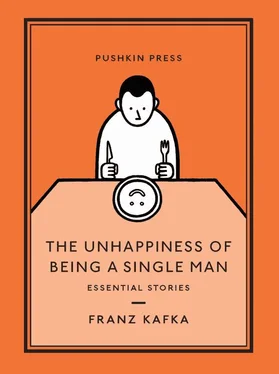The researcher had tilted one ear towards the officer and was watching the machine with his hands in his pockets. The condemned man watched it too, but without understanding what it did. He crouched a little and followed the movements of the swinging needles until the soldier, at a signal from the officer, used a knife to cut through his shirt and trousers from behind so they fell off him; he tried to grab at the falling clothes to cover himself, but the soldier lifted him into the air and shook the last scraps of fabric off him. The officer paused the machine and in this new quiet the condemned man was laid down under the harrow. His chains were taken off and replaced with straps; at first, this seemed to strike the condemned man as an improvement. Then the harrow lowered itself a little further, because the man was comparatively thin. When the needles touched him, a shudder ran across his skin; the soldier was busy securing his right hand, but his left stretched out without knowing what for; it happened to reach in the direction of the researcher. The officer watched the researcher constantly from the corner of his eye, as if trying to see what impression the execution, which had been at least superficially explained, was making on him.
The strap for the man’s right wrist snapped; the soldier had probably pulled it too tight. The soldier held up the torn strap, asking for help. The officer went over to him and, his face turned towards the researcher, said, “The machine has lots of moving parts, it’s inevitable that something rips or breaks from time to time, but you can’t let that skew your overall opinion of it. A strap like this we can replace straight away; I’ll use a chain instead, even though that’ll make the bed’s motion a little less smooth for the right arm.” And while he fastened the chain, he added: “Our resources for maintaining the machine are very limited these days. Under the old commandant, I had an unlimited budget solely for repairs. We had a small warehouse where we kept all kinds of replacement parts. I admit that I almost got wasteful with it all, I mean before, not now, whatever the new commandant likes to claim; he’ll use anything as a pretext to attack the old way of doing things. These days he oversees the repair budget himself and if I put in a request for a new strap, I have to present the broken one as evidence it’s needed, then it’ll take ten days for a new one to arrive, and when it does it’ll be terrible quality and basically useless. As for how I’m supposed to keep the machine going in the meantime, that’s something no one bothers about.”
The researcher considered. Intervening in other people’s affairs is always a dubious proposition. He was neither a resident of the penal colony nor a citizen of the state to which it belonged. If he wanted to condemn this execution or even try to prevent it, they could have said to him: you’re a foreigner here, keep your opinions to yourself. He would have had no response to that; at most he could have added that he was a little surprised by his own behaviour, because the purpose of his travels was to act as an observer and in no way to try and get mixed up in other countries’ judicial processes. But in this instance it was very tempting. The injustice of the procedure and the inhumanity of the sentence were beyond doubt. Nobody could have suspected the researcher of having any vested interests, since the man was a stranger to him, not a compatriot of his and not someone who inspired any particular compassion. The researcher himself had arrived with letters of recommendation from the highest officials, had been welcomed here with the greatest respect, and the fact that he had been invited to watch this execution seemed to suggest that he was being asked his opinion of what was going on. That was all the more likely since the commandant, as he’d heard all too clearly, was no supporter of this process and seemed to be treating the officer with something bordering on hostility.
At that moment, he heard the officer give a cry of rage. He had just, not without effort, pushed the felt block into the condemned man’s mouth when the latter succumbed to an irresistible nausea, closed his eyes and vomited. The officer hastily tore the block from his mouth and tried to turn the man’s head towards the ditch, but it was too late, the vomit had already spattered the machine. “It’s all the commandant’s fault!” shouted the officer and started wildly rattling one of the brass poles in his fury. “They’re making my machine as dirty as a cowshed.” With trembling hands, he showed the researcher what had happened. “Haven’t I spent hours trying to make the commandant understand that prisoners shouldn’t be given anything to eat for a day before the execution? But no, this new mild approach means they have other ideas. Before the man’s led away, the commandant’s ladies stuff him full of sweets. His whole life, he’s lived on stinking fish and now he’s got to eat sweets! That’s not a catastrophe, I wouldn’t complain, but why don’t we ever get a new block, something I’ve spent three months asking for? How could you not be disgusted, putting something in your mouth that more than a hundred men have sucked and bitten on while they died?”
The condemned man was resting his head and looked peaceful; the soldier was busy using the man’s shirt to wipe the machine. The officer went over to the researcher who, suspecting something, stepped back a little. But the officer took him by the hand and pulled him aside. “I’d like to have a word with you in confidence,” he said, “That’s all right, isn’t it?”
“Of course,” said the researcher, and listened with his eyes lowered.
“This procedure and this execution you’ve been given the opportunity to admire no longer has any public supporters here in our colony. I’m its only defender, and the only one standing up for the old commandant’s legacy. I can no longer hope to develop the procedure any further, it takes all my strength just to preserve what we already have. When the old commandant was still alive, the colony was full of his supporters; I may have some of his powers of persuasion, but I don’t have any of his authority; as a result, all his supporters have gone underground, there are still lots of them, but no one admits to it. Today—that is, an execution day—if you go to the tea house and listen in, all you’re likely to hear is ambivalent chatter. Those are all supporters, but under the current commandant and given his current attitude, they’re completely useless. So I ask you: should the arrival of this commandant and the ladies who influence him mean that a life’s work”—he gestured at the machine—“is destroyed? Can you allow that to happen? Even if you’re a foreigner who’s only spending a few days on our island? Believe me, there’s no time to lose; they’re already concocting an attack on my judicial authority; they hold discussions I’m not invited to in the commandant’s office; even your visit today is typical of the whole situation; they’re cowards and so they prefer to send you, a stranger, in their place.—You should have seen how different the executions were in the old days! A day before the execution had even started, this valley would be full of people; everyone came to watch; the commandant and his ladies would appear early in the morning; the camp was woken with fanfares; I reported that everything was ready; the colony’s best people—not one senior official would miss it—arranged themselves nearest to the machine; this pile of chairs is a miserable remnant from that time. The machine would be gleaming, freshly polished: I’d use some replacement parts for almost every execution. In front of hundreds of pairs of eyes—the spectators would be standing on tiptoe all the way to the cliffs—the condemned man would be laid under the harrow by the commandant himself. The work that these days is done by a common soldier was assigned to me, the president of the court, and was considered an honour. And then the execution began! There was no screeching to disturb the smooth running of the machine. Some people didn’t even watch, just lay there in the sand with their eyes closed; but they all knew: justice is being done. In the hush all you could hear was the groaning of the condemned man, muffled by the block. These days the machine can’t even elicit any groans that the block won’t stifle; back then, the writing needles discharged an acid that we’re not allowed to use any more. Well, and then the sixth hour came around! It was always impossible to find room for everyone who wanted to watch from close up. The commandant, with his usual wisdom, ordered the children to be let through; for my part, I got to be there because of my duties; I’d often be sitting right there with a small child in each arm. How attentively we watched the transfiguration of their tormented expressions; how close we kept our own faces to the splendour of that justice, which was already fleeting in the moment it was finally achieved! What good times, old friend!” The officer had plainly forgotten who was standing in front of him; he’d put his arm around the researcher and rested his head on the researcher’s shoulder. The researcher was extremely embarrassed and impatiently looked past the officer to the others. The soldier had finished cleaning up and was pouring more rice porridge from a can into the bowl. As soon as the condemned man noticed this—he seemed to have completely recovered—he again began to slurp up the porridge with his tongue. The soldier kept pushing him away, because the porridge was meant for later on, but he didn’t seem to be behaving properly either as he scooped up the prisoner’s porridge with his dirty hands and ate it himself.
Читать дальше












